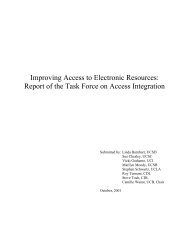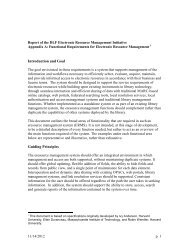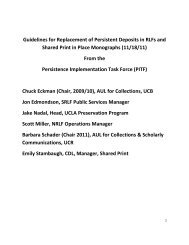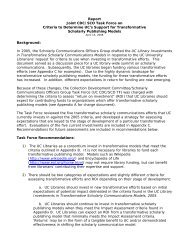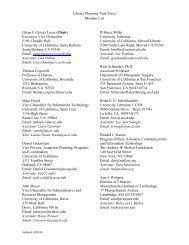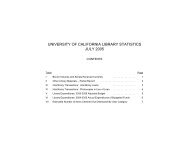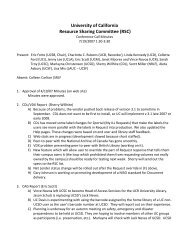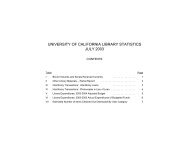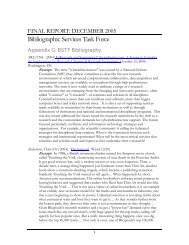The University of California Libraries: A Plan for Development (1977)
The University of California Libraries: A Plan for Development (1977)
The University of California Libraries: A Plan for Development (1977)
Create successful ePaper yourself
Turn your PDF publications into a flip-book with our unique Google optimized e-Paper software.
IV. A <strong>University</strong> Library System 47<br />
library automation that characterized the 1960s was marginal or even<br />
nonexistent." 7 When shared by a number <strong>of</strong> libraries, however, "on-line<br />
computer-based operational programs constitute a radical and permanent<br />
change in cooperative style" that "may well be by far the most significant<br />
change ever achieved in library operations." 8<br />
2. <strong>The</strong> collections <strong>of</strong> the library system as a whole must be<br />
comprehensive, and as distinguished in quality as the <strong>University</strong> served.<br />
Only if the libraries can build and maintain a web <strong>of</strong> specialized, indepth<br />
collections <strong>of</strong> materials serving and supporting fully the research<br />
interests <strong>of</strong> the <strong>University</strong>'s scholars and students will the library<br />
system become and remain great.<br />
In this connection, it is important that the analysis <strong>of</strong> the function<br />
<strong>of</strong> the library as a source <strong>of</strong> in<strong>for</strong>mation, as discussed in Chapter II, not<br />
be interpreted superficially. Obviously the libraries <strong>of</strong> the system must<br />
be more than mere filling stations <strong>for</strong> in<strong>for</strong>mation; they are integral<br />
parts <strong>of</strong> the educational process, and <strong>for</strong> many students the education<br />
that takes place in the library can be as important as what takes place<br />
in the classroom. For many disciplines, the libraries serve as the principal<br />
laboratory <strong>for</strong> research, and <strong>of</strong> course <strong>for</strong> literary scholars books<br />
are not simply means to in<strong>for</strong>mational ends, but objects <strong>of</strong> study in themselves.<br />
<strong>The</strong> collections <strong>of</strong> the libraries also serve as archives <strong>of</strong> knowledge,<br />
as reservoirs <strong>of</strong> in<strong>for</strong>mation maintained indefinitely into the future, and<br />
available at all times <strong>for</strong> research and instructional support. Unless<br />
the archival function is preserved, valuable and even crucial in<strong>for</strong>mation<br />
may be lost to society, an event that has happened all too frequently in<br />
the past.<br />
Immediacy <strong>of</strong> Need. Several <strong>of</strong> the <strong>for</strong>egoing conclusions—especially<br />
those that relate to the need <strong>for</strong> acquisition programs geared<br />
7 Richard De Gennaro, "Austerity, Technology and Resource Sharing: Research<br />
<strong>Libraries</strong> Face the Future," Library Journal, v. 100 (May 15,<br />
1975), p. 918.<br />
8 David C. Weber, "A Century <strong>of</strong> Cooperative Programs Among Academic<br />
<strong>Libraries</strong>," College and Research <strong>Libraries</strong>, v. 37, no. 3 (May 1976),<br />
p. 219.



